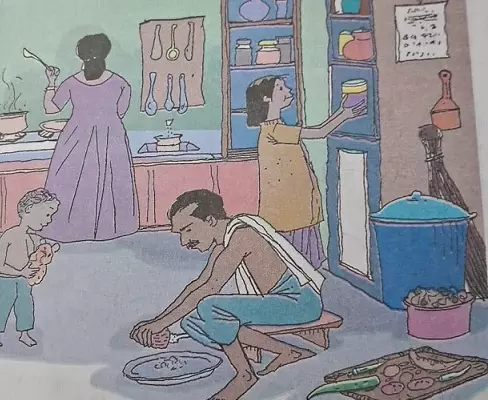
'Fathers can cook too': Kerala textbooks impart lessons on gender equality, inclusivity
New textbooks introduced by LDF government for classes 1, 3, 5, 7 and 9, also carry lessons on decision-making and artificial intelligence among others

The cover of the Malayalam Reader for first grade students in Kerala features two children walking hand in hand. One is a girl, and the other could be a child of any gender with long hair. This reflects a characteristic of the new textbooks introduced this year by the Left Democratic Front (LDF) government.
The cover design features a girl in a wheelchair, a farmer driving a tractor, a boatman and a working-class individual – all highlighted on a backdrop of vibrant greenery and diverse flora and fauna, representing the theme of inclusiveness.
Cover design of Kerala Reader for Class 1.
The newly revised textbooks have been distributed to classes 1, 3, 5, 7 and 9, and they are now available in all schools.
Breaking moulds
“Our school textbooks had been progressing at a snail’s pace for the last quarter of a century. Now, they have started to break away from moral confines and traditional habits, which is very satisfying,” observes Smitha Pannian, a teacher and researcher.
A section in the Class 3 textbook addresses the topic of labour and language, aiming to introduce students to labour-related vocabulary.
“The kitchen is the main workplace in a house,” says the textbook, accompanied by an illustration of a kitchen where both the father and mother are engaged in preparing food, while a child is seen helping them. In the Malayalam version, the father is shown grating a coconut while the mother is cooking food on the stove.
Dad in kitchen
In the English Reader, which follows the life of Sasha, a student, the father is busy in the kitchen preparing her favourite snack. This new portrayal of the man in the kitchen, reflects another step by the LDF government in Kerala towards ensuring gender-justice through education.
“It’s indeed a powerful message to children that the kitchen isn’t solely meant for mothers; fathers should also share the workload,” says Kerala Revenue Minister, K Rajan.
“I adore both these images. Following the coconut grating, I hope the father prepares either chicken curry, fish curry or roti. A kitchen where everyone in the household shares duties and cooks healthy meals would, in my opinion, become the most appealing and innovative area in the house,” says writer CS Chandrika.
Lessons on diversity, inclusivity
The Class 3 textbook shows Sasha and her friend Naveen at school, where they meet Kabitha, another child from a different state who does not speak Malayalam, referring to the children of migrant labourers. Naveen and Sasha help Kabitha to get enrolled in their school.
The theme is continued in Class V, where children from diverse backgrounds are introduced during a picnic. Among the picnic attendees are Neenu, who uses a wheelchair and resides in a government officer’s quarter; Appu, the son of a single mother employed in a cotton mill; Vicky, who lives in an urban apartment and is the son of a businessman; and Chameli, a migrant labourer’s child who has moved from another state and resides in a colony.
The textbooks introduce children to peers from diverse backgrounds to teach them inclusivity.
In addition to promoting the politics of inclusiveness, the fifth-grade social science textbook subtly raises awareness among children about environmental sensitivity. It highlights the significant ecological impact of tons of discarded clothes and discusses ways they can be reused and recycled.
Decision-making
The same textbook has a chapter where the class teacher seeks the opinions of the students regarding conducting a study tour, emphasising the importance of everyone’s participation in decision-making. This serves as a prelude to their lessons on democracy and decision-making by local governments, introducing students to the functioning of ward councils and panchayats.
The life of Mahatma Ayyankali, one of India’s earliest Dalit reformers who championed the rights of oppressed people in Travancore, advocating for education has been incorporated into the Sanskrit textbook for seventh-grade students.
The lesson is Ayyankali’s conversation with a feudal lord as he emphasises the importance of education for oppressed communities, stressing the significance of literacy and learning to read and write.
Artificial Intelligence
The lesson refers to the incident at Ooruttambalam School, which was set ablaze by the upper caste lords in 1914, in protest against the admission of a Dalit girl.
The Kerala syllabus had already grabbed the headlines when the government decided to introduce Artificial Intelligence in text books. AI learning has been introduced into the Information Communication Technology textbook for Class 7 students, marking a significant advancement in technological education in the state.
In the ‘Computer Vision’ chapter, students will create an AI programme capable of recognising up to seven human facial expressions. This hands-on experience will offer them a practical insight into AI applications.
Constitution preamble
The decision to introduce AI learning uniformly for all students in a class is the first of its kind in India, underscoring Kerala’s dedication to equipping its youth for the digital era.
In addition to these syllabus revisions, all textbooks now include the preamble of the Constitution due to a political decision by the government. Previously, the state government had chosen to issue supplementary textbooks containing the history and civics sections that were controversially removed by the NCERT.

